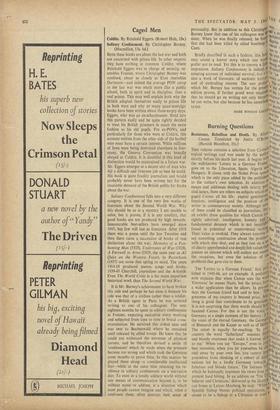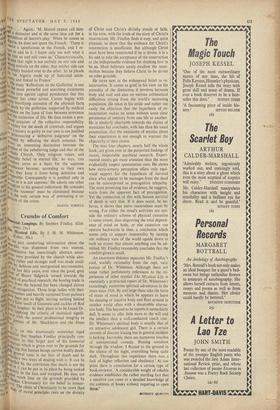Burning Questions t I a so Resistance, Rebellion and Death.
By Albert Camus. Translated by Justin O'Brien' `rialinat ran,%s on (Hamish Hamilton, 21s.)v THIS volume contains a selection from Camus' topical writings and was made by the autbill ts-`a°Iie shortly before his death last year. It begins With 111;eciall the well-known 'Letters to a German Friend ot,',efort goes on to the Liberation, Spain, Algeria art' 1(,11iishni Hungary. It closes with the Nobel Prize speech which is the only piece added by the publisher/ R° natal to the author's own selection. In addition to t\eara5 essays and addresses dealing with strictly poll. thatenti° tical issues, there are others on subjects which erl" it is the gaged Camus all his life: capital punishmerit' ;pet. the freedom, intelligence and the position of tit! "l()11 writer in contemporary society. Although 111°/: of them could be classified as journalism, thei all exhibit those qualities for which Camus Wat rightly admired: intelligence, honesty and %rim fundamental decency which is not invariabl, )1.4 found in polemical or controversial The Their value is twofold. They always contrive (i7 say something constructive about the problen.,13 I\ it al with which they deal, and as they rest on a Pi ifte"Ite I of clearly apprehended and deeply felt values thew' possess an interest which will outlast not merely tn;°111 the occasions, but even the solution of vtitei.NN problems that gave rise to them.ll The 'Letters to a German Friend,' first pub nn the I; lished in 1943-44, are an example. A prefalnld of note explains that when Camus uses the Wor, ibject 'Germans' he means Nazis, but the letters have ;e\lvs frc a wider application than he allows. In pre-war of 1• days the German friend had said to him: , `t hour greatness of my country is beyond price. Any " :ve be thing is good that contributes to its greatness'' a fa It is not surprising that these words should have kiklian haunted Camus. For this is not the voice .4 prN Germany at a single moment of her history: it ,r11`.:aee the voice of the eternal Germany, the German,' Tb e gue of Bismarck and the Kaiser as well as of The retort is equally far-reaching. 'In edor31,1t is ; country the word "fatherland" assumes 1,11..,,t and bloody overtones that make it forever 910 'Iltrote to me.' When you say "Europe," even in yo'jil TiginA best moments, when you let yourselves be eat
1
tied away by your own lies, you cannot iq, ' a n asidel yourselves from thinking of a cohort of (IOC,: nations led by a lordly Germany towards; ad i fabulous and bloody future.' The fairness Wl,, which he habitually expresses his views does 0.9',4, tdrei prevent hard hitting. In an address on 'The OiN.Prekad n believer and Christians,' delivered at the DonA ' ,,`."(10 can house at Latour-Mauberg, he said: 'Wheni '',11Y.1 Spanish bishop blesses political executions,, h, uaily ceases to be a bishop or a Christian or even ' [ 9 61 III= SPECTATOR. MAY 5. 1961 vbet Illaa • . .' Again: 'M. Marcel cannot call him- is bb self a democrat and at the same time ask for a OS l'-`'hibition of Sartre's play.' When he comes to ig ii Algeria, he does not spare the, French: `There is
I Inde
, !4Z1 a spitefulness in the French, and I re- ,i, ittse bool has to add to it. I know only too well what it Lcosta 'ost us and still costs us.' Characteristically, siot14 he sees that right is not entirely on one side and fall gong entirely on the other, that neither side can d 4 be si,lnPlY handed over to the other. So he pleads it a fai an Algeria made up of federated settle- llour Inen s and linked to France.' elect? ' The ie essay 'Reflections on the Guillotine' is one ego II the most powerful and searching statements aired (4. t le case against capital punishment that this cause reviewer has come across. Camus begins with third '°11-1 Of d ' horrifying accounts of the physical facts '''!ath by the guillotine, supported by medical +ar° t\ id tnee on the lapse of time between severance
4ryd
i the extinction of life. He then makes a pro- .0„„ of's'al. criticism of the collective responsibility ihm 'ciety for the deeds of criminals, and argues : a society as guilty as our own is not justified Ober/ 'I' Dr.onouncing a 'definitive judgment' on the 3rica. erlti a lnal by inflicting the death sentence. He .ra„ mus,s ,,,,,,,,sil an interesting distinction between the ton of the unbelieving judge and that of the uth3r e"thellc Church. `Only religious values, and with tile4111+ belief in eternal life,' he says, 'can iead: Let!fore d von serve as a basis for the supreme ail lo • shment because, according to their own leech ' irte ', they keep it from being definitive and ;shed E'arable. Consequently it is justified only in in to k" f 1r as it is not supreme.' He admits one other poll' \ Q ih,ite Piton to his general indictment. He concedes h et' ii i the 'monster' must be eliminated because ,pentp, '. the only certain way of preventing a re- f the qitIon of the crime.







































 Previous page
Previous page